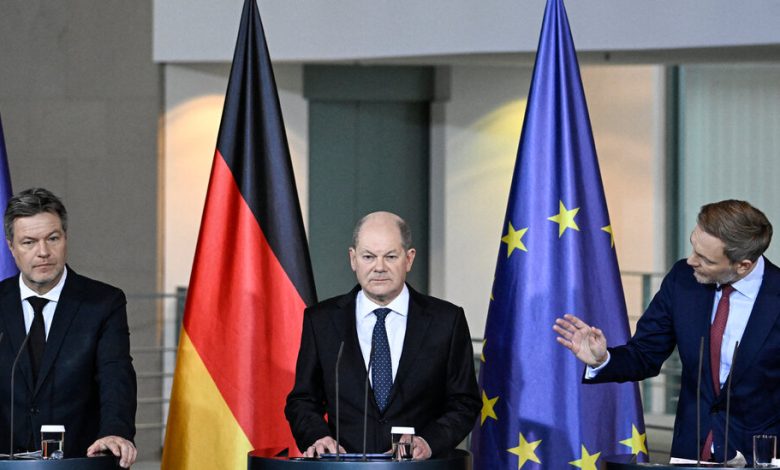Germany, Roiled by a Court Ruling, Finally Has a Budget

Nearly a month after a court ruling left a hole in Germany’s 2024 budget, the government in Berlin introduced a new spending plan that included cuts in programs to address climate change, but confirmed its commitment to 8 billion euros ($8.6 billion) in direct military aid to Ukraine.
The new budget will comply with the constitutional rules against taking on new debt, the government said.
“We are forging ahead with the climate-neutral transformation of our country. We are strengthening social cohesion. And we are standing closely by Ukraine’s side in its defense against Russia,” the chancellor, Olaf Scholz, said Wednesday morning.
“However, it is clear that we will have to make do with significantly less money to achieve these goals,” he added.
Cuts were made from a fund to help businesses move toward more environmental-friendly practices, and subsidies were reduced for electric vehicles and solar energy. Subsidies promised for a new semiconductor factory will be kept.
Announced before lawmakers go on holiday break on Friday, the spending plan came after prolonged and arduous negotiations that had threatened to rupture the government’s three-party coalition. Lawmakers must still vote on the plan, but it’s expected to pass because the coalition has a majority in parliament.
Germany’s budget crisis started four weeks ago, when the nation’s top court ruled that the government had violated the constitution by transferring a special €60 billion fund created to deal with the Covid pandemic emergencyinto a “climate and transformation fund.” German law sharply restricts government borrowing above certain limits unless the money is for emergencies. While the pandemic qualified as an emergency, the court said ministers could not use the money for other purposes.
The money had been planned for both 2023 and 2024. In order to keep this year’s budget within the law, the government said the rising cost of energy caused by Russia’s war in Ukraine constituted an emergency. But that designation would not apply to next year’s budget, leaving a €17 billion shortfall.
That put the spotlight on the differences among the coalition partners: the Greens seeking money to spend on climate transformation; the Social Democrats wanting to secure extra funding for social security payments; and the liberal FDP party, which wanted to avoid tax increases and preservesubsidies for commuters using cars. Christian Linder, the head of the FDP and the finance minister, appeared willing to start 2024 without having a budget in place.
The crisis has taken a political toll on a government that had been facing criticism for other reasons. According to a recent national poll, only 19 percent of respondents thought Mr. Scholz was suited to the job of chancellor. And the leader of the conservative party, which has been critical of the government’s handling of the budget issues, demanded that Mr. Scholz face a confidence vote when parliament returns in 2024.
While there was some criticism of the budget agreement from business groups, many agreed that it was important to finally have a budget.
“It is both good and important that the federal government has reached an agreement,” Bertram Kawlath, the vice president of the VDMA, an industry association of mechanical engineers, said in a statement. “The weeks of uncertainty are now over, clearing the way for important investments,” he said.



